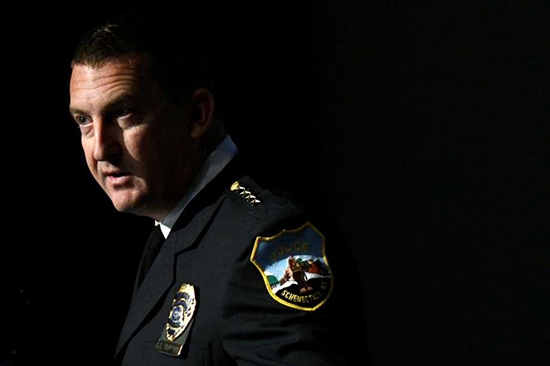Eric Clifford ’94 joined the Schenectady Police Department in 2002, becoming its chief in September 2016. He is a certified crisis negotiator, a Zone Five Regional Police Academy instructor, the former call-out coordinator for the peer support team, and is a trained bicycle police officer. He is on the board of directors for the Zone Five Regional Police Academy and the Capital Region Crime Analysis Center.
On March 31, Chief Clifford answered some of our questions about the COVID-19 pandemic and its impacts on the Schenectady Police Department and local community.
Q: On March 28, the Daily Gazette reported that a Schenectady Police Department officer tested positive for COVID-19. How has the outbreak changed the way you and your officers do your jobs?
A: Like most Americans, this outbreak has forced us to change the way we do things very fast. We started planning for this about a month before it hit us by ordering supplies. Since then we have had to continually evaluate our core mission and make plans to be prepared – for both an increased demand for our services and how we would react should an outbreak hit our department. I am evaluating potential direct effects on all officers (exposure, absenteeism, productivity reductions, emotional trauma and mortality). I am also looking at indirect effects, such as our reduced ability to deliver services to the public, delayed investigations, reduced supervisor capacity, maintaining professionalism and discipline, and the public reaction to a reduced service delivery.
Q; How has the coronavirus changed the way officers interact with one another and the public?
A: We have changed everything in respect to how we interact with one another and the public. We typically spent hours each week providing community policing. We had to stop that. We typically would muster internally to prepare and conduct post-event briefings. We now do it in our lobby to create space between officers. We also conduct more video conferences and phone conferences to limit exposure. Our civilian staff members are working from home if they can.
Q: What advice would you offer people to help them stay safe and healthy?
A: I have stressed the importance of listening to our federal, state and local leaders to all of my officers and civilian staff. The advice these leaders communicate should be mandatory. Short-term pains will bring us back to the way we were. Stay at home if you are sick. Cover your mouth when coughing or sneezing, wash your hands regularly, avoid touching your face and maintain distance from others. Embrace technology to stay connected, but do not get news or advice on this pandemic from social media. The only authorities to trust are the State Department of Health and Centers for Disease Control and Prevention.
Q: Similarly, how can people help your officers and other first responders stay safe?
A: During this time, more than ever, we must come together as a community. We need to help each other. We need to respect each other’s space. We need to be patient and not lose our cool over small things. First responders need to be available to protect life and property. The most important thing that people can do to help officers and first responders stay safe is to stay home and follow all the guidelines our leaders have been giving.
Q: Are there any new programs your department is enacting to help our community effectively manage this situation?
A: We have begun doing story time online (Facebook) to substitute for not making it to the schools to read to our community’s youngest members. We are also helping where we can to deliver meals to those who need them. Internally, I have started providing daily video messages to my officers and staff using the application called SLACK. This has helped us stay connected.
Q: Have you seen changes in public behavior because of the epidemic?
A: We have seen public behavior change. Many people seem to be concerned and are taking stay-at-home orders seriously. Not surprisingly, some are not. We have had to close playgrounds and basketball/tennis courts due to people using them.
Q: Any other thoughts?
A: These are trying times for all of us. What is most important for us all is to come together, stay united and help our neighbors. Call your loved ones – do not visit. If anyone needs assistance, do your best to provide it. Let’s help each other get food. Our state and local leaders are working hard to guide us through this. Support them in these efforts. Our doctors, nurses and emergency medical technicians/paramedics all deserve our appreciation during these times.
